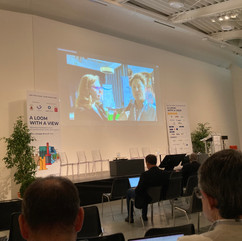Promoting Citizen Science Benefits to Major Cities of Europe
- pavel874
- Oct 30, 2023
- 3 min read
Is it a space ship? A moonbase prototype? No, it's the place we called home for three days while attending this year's Major Cities of Europe (MCE) conference, held in Prato's futuristic-looking Luigi Pecci Centre for Contemporary Art.

COMPAIR at MCE 2023 in Prato
It wasn't just the place that was otherworldly. The event's title too was something out of the ordinary. A loom with a view: weaving the digital future of communities, cities, and regions.
The title is meant to represent a visionary path for cities, many of which have a strong industrial base - Prato for example is the largest textile centre in Italy - to evolve themselves into digital innovation hubs with the smart city concept at the core.
What does a city need to have/do to be considered smart? An open data portal? A digital twin? An AI supported signalling system? 5G? MaaS? E-voting? LEZ? PEDs? Urban farming? Superblocks?
All these elements are important in their own right but if we were to name one thing that represents the cornerstone of smart cities it would be... citizens. Without them on board cities will struggle to unlock the full potential of digital tranaformation, not to mention the path toward climate neutrality, which requires everyone to play their part.
'Citizens are the greatest asset cities have at their disposal' was our motto at MCE. We conveyed it to delegates at the booth and in the main hall during presentations and panel discussions, emphasizing that tools and data obtain their value when they are used and serve the greatest number of people. What's more, far from being passive consumers of technology, citizens can be active agents of change by contributing data for policy making and research, and by supporting solution development through co-creation.
COMPAIR presentations, booth and panel discussions at MCE
In COMPAIR, we stimulate agency by leveraging citizen science, a form of social innovation that harnesses the power of the crowd to find solutions to common problems. We empower communities to act on local challenges (in our case - air pollution) by engaging them in a full co-innovation cycle, from problem formulation to sensor assembly to data collection, analysis and follow-up action.
The feedback we get from volunteers shows that participation in COMPAIR leaves people more knowledgeable about air pollution and climate change, how the two are related, and how their action, or inaction, can make things better, or worse.
Volunteers especially appreciate seeing impact on policy (e.g. school street in Herzele), a sign that their contribution matters, that it is not a box ticking exercise for public authorities but something that can effect changes on a bigger scale. This, combined with the use of innovative digital tools that contain elements of environmental psychology (e.g. gamification), makes people more inclined to change their habits and lifestyles for their own benefit as well as the greater good.
Most people we talked to at MCE were aware of citizen science, less so of its benefits and usage in an urban context. However, upon learning about our work in pilot cities, participants began to appreciate the value that citizen science can bring to cities and citizens. What was especially encouraging is that many city reps expressed interest in deploying our sensors to tackle entrenched problems in their communities e.g. Telraam to address noise pollution from traffic in the suburban areas around Leipzig.
If you would like to know how COMPAIR can help your city become smarter and more sustainable, drop us a message via contact form.



















